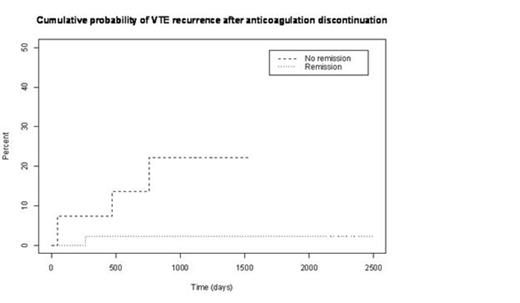Abstract

Introduction: Upper extremity deep vein thrombosis (UEDVT) is a frequent complication of central venous catheters in cancer patients. Anticoagulation with low molecular weight heparin (LMWH) for a minimum of 3 months is the currently recommended treatment for catheter-related UEDVT in cancer patients. Following catheter removal and a minimum of three months of anticoagulant therapy, the risk of recurrence of VTE is likely to be low and it might be reasonable to discontinue anticoagulant therapy. However, there are no data available to support these hypotheses. Therefore, we sought to assess the efficacy and safety of LMWH for the treatment of catheter-related UEDVT in cancer patients and determine the risk of recurrence of VTE after discontinuation of anticoagulation.
Material and methods: A retrospective single center cohort study including consecutive cancer outpatients assessed between July 2008 and December 2012 for the management of symptomatic central venous catheter associated proximal UEDVT was conducted.
Results: A total of 99 patients were included. Among them, 89 were treated with one month of full therapeutic weight-adjusted dose of LMWH followed by an intermediate dose. A prophylactic dose of LMWH was given after 3 (n=8), 6 (n=4), or 12 (n=1) months of intermediate dosing of LMWH. The remainder patients continued with intermediate dose of LMWH until discontinuation or last follow up. Median duration of anticoagulation was 124 days (range 40 to 1849). No recurrent VTE and two major bleeding episodes occurred during the first 3 months of treatment. Among the 13 patients who were receiving prophylactic doses of LMWH after completion of 3, 6 or 12 months at full and intermediate doses, 2 (15.4%) had a recurrent VTE event. Others did not recurred while on treatment.
Eighty-three patients discontinued anticoagulation and 80 could be followed-up after anticoagulation discontinuation for a median of 632 days (range 6 to 2495). Central venous line was pulled out in 77 patients (96.2%). Five recurrences were observed during follow up. The cumulative probability of recurrent VTE was higher in patients whose cancer was active at the time of anticoagulation discontinuation as compared with those in remission (22.2% (95% CI: 0 to 40.6) vs. 2.3% (95% CI: 0 to 6.7)) (Figure 1).
Conclusion: LMWH can safely be used to treat catheter associated proximal UEDVT in the setting of cancer. In patients whose central venous line has been pulled and cancer is in remission, anticoagulation therapy can be safely discontinued.
No relevant conflicts of interest to declare.
Author notes
Asterisk with author names denotes non-ASH members.

This icon denotes a clinically relevant abstract


This feature is available to Subscribers Only
Sign In or Create an Account Close Modal